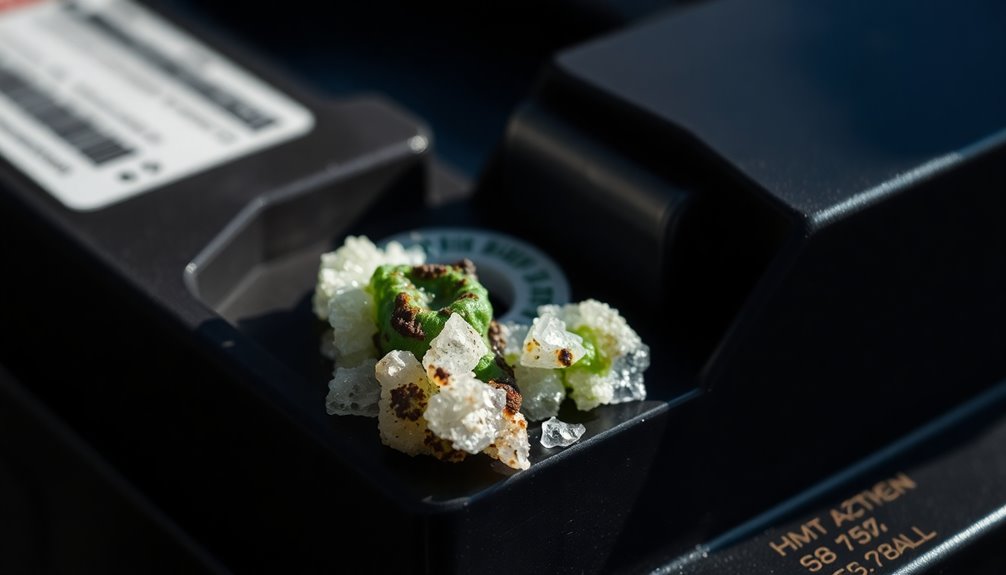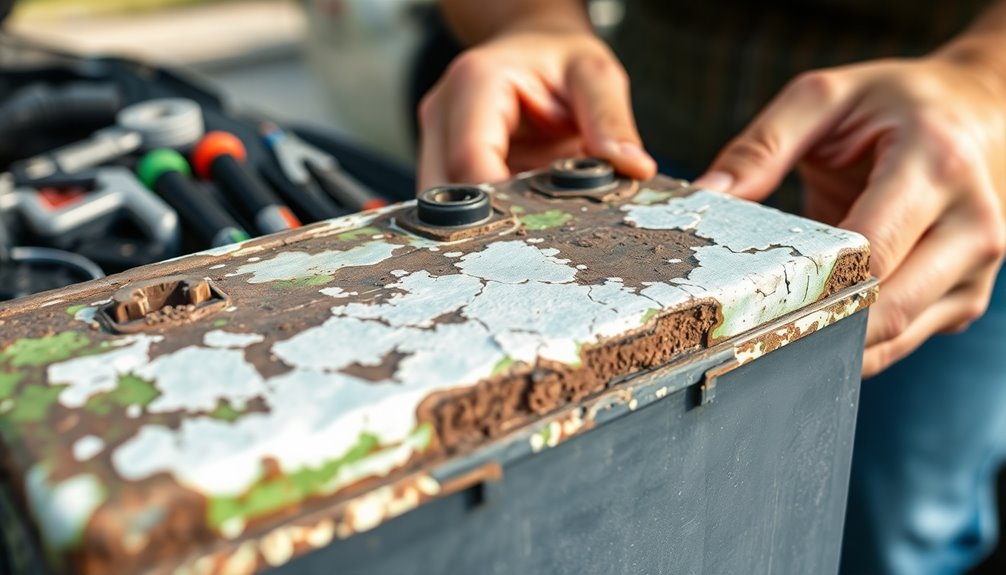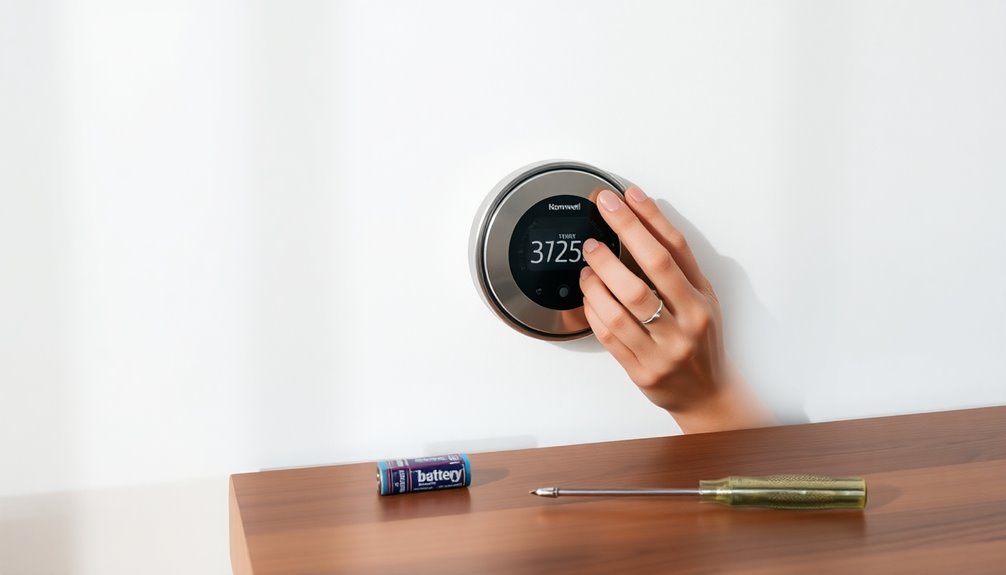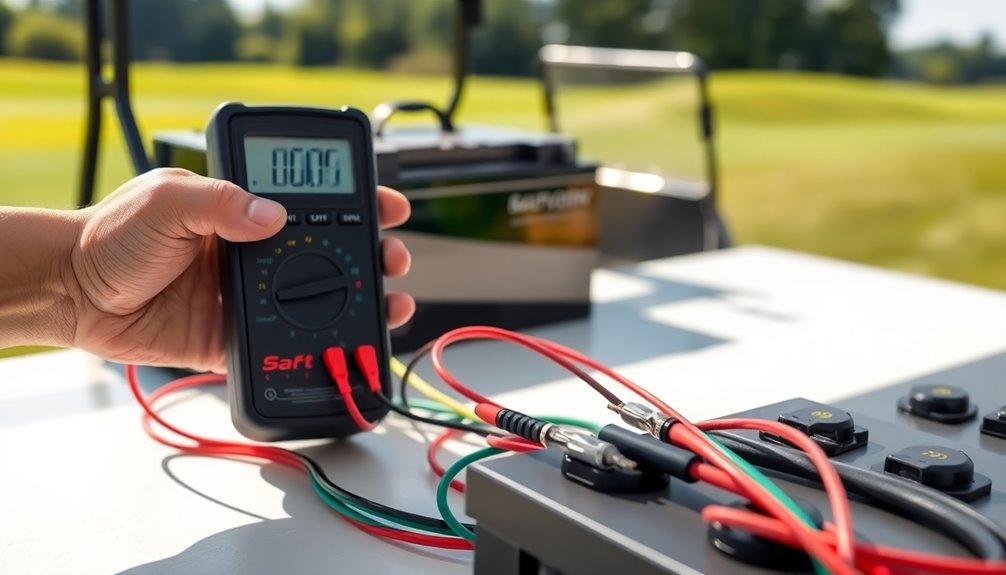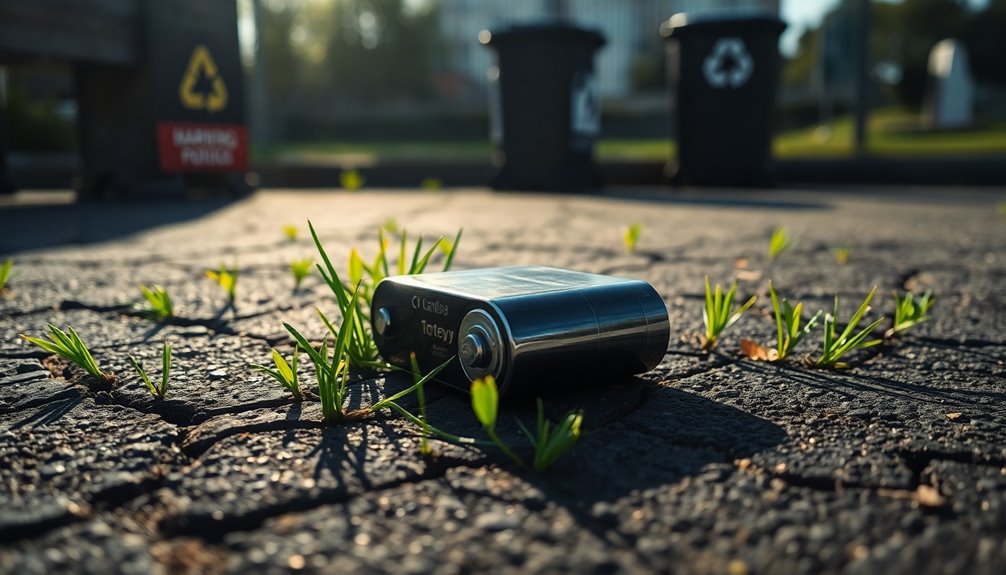Yes, corrosion can drain your car battery. It reduces electrical conductivity, making it harder for the battery to deliver power. When you notice crusty deposits on the terminals, that's a sign of corrosion affecting your battery's performance. You might experience slow cranking or flickering headlights due to poor connections. Left untreated, corrosion not only hampers your vehicle's starting power but can also shorten the battery's lifespan. Regular maintenance and inspections can help prevent this issue. Want to know more about how to identify and manage corrosion effectively? There's plenty to discover about keeping your battery in top shape!
Key Takeaways
- Corrosion reduces electrical conductivity, hindering the battery's ability to deliver power effectively.
- Poor connections caused by corrosion can lead to insufficient power for starting the engine.
- Dimming headlights and slow cranking can indicate corrosion-related power drain issues.
- Prolonged corrosion may cause parasitic drain, shortening the battery's lifespan.
- Regular cleaning and maintenance can prevent corrosion and its impact on battery performance.
Understanding Battery Corrosion
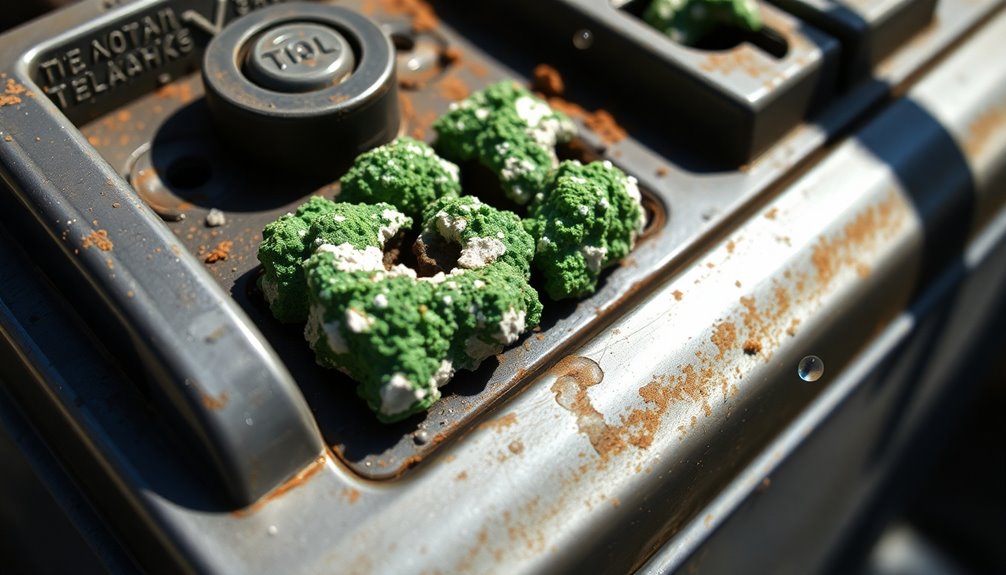
Battery corrosion is a common issue that can arise from various factors affecting car batteries. It typically results from corrosive gases or liquids leaking from the battery, which react with metal terminals and cables.
Overcharging your battery can lead to overheating, causing the liquid inside to expand and potentially leak through vent holes. If you add too much distilled water to refillable batteries, the acid mix may spill onto the battery's exterior, leading to corrosion.
In maintenance-free batteries, small vents can allow sulfuric gases to escape, making contact with the terminals and causing damage. Aging batteries, especially those around 5 to 7 years old, are more susceptible to corrosion as they approach the end of their lifespan.
The chemical reaction that triggers corrosion involves sulfuric acid and lead plates inside the battery, producing hydrogen gas that combines with oxygen, contributing to corrosion. Overfilling batteries can lead to acid leaks that exacerbate corrosion issues.
Moisture and salt in the air can speed up this process, while the location of battery vents plays a crucial role in how easily gases escape. Understanding these factors can help you take preventive measures to protect your battery from corrosion.
Impact on Battery Performance

Corrosion can significantly impact battery performance, affecting how well your car starts and how its electrical systems operate. When corrosion builds up on battery terminals, it reduces electrical conductivity, making it harder for your engine to start. You might notice slow cranking or, in some cases, no cranking at all.
Poor connections due to corrosion can lead to insufficient power reaching the starter motor, creating intermittent starting issues that can be frustrating to diagnose. Moreover, corrosion doesn't just affect the starting process; it disrupts power flow to essential electrical systems like headlights, brake lights, and turn signals. You may experience erratic performance from systems like air conditioning or onboard computers due to compromised connections. This can lead to frequent malfunctions that are difficult to trace back to corrosion.
Prolonged exposure to corrosion can even damage your battery, shortening its lifespan and causing a parasitic drain that leads to gradual discharge. Reduced electrical conductivity resulting from corrosion can also lead to an overload on the alternator as it tries to compensate for the lack of power flow.
Regular maintenance to clean or replace corroded terminals is crucial to ensure your battery and vehicle's electrical system function smoothly, preventing further issues and potential alternator failure down the line.
Identifying Signs of Corrosion
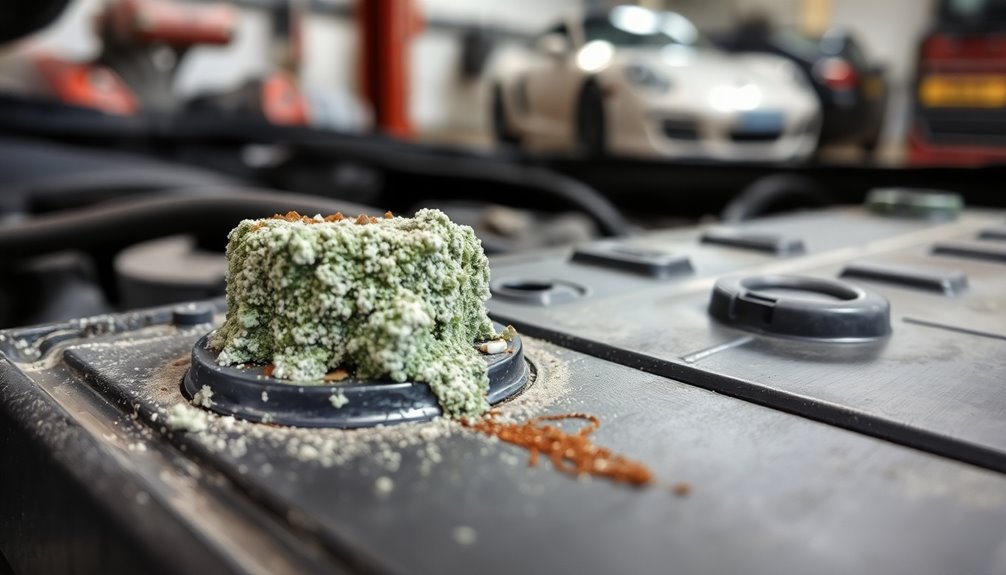
When you're troubleshooting battery issues, knowing how to identify signs of corrosion is essential. Start by visually inspecting the battery terminals and posts for any white, blue, or green crusty deposits. These deposits often have a granular, powdery texture, indicating corrosion.
Look for flaky grime that can range from white to greenish hues, particularly on the terminals and cables. Corroded areas might even resemble rust or mold.
Pay attention to symptoms related to corrosion, such as difficulty starting your vehicle, especially if the engine cranks slowly. Dimming or flickering headlights can also be a warning sign. If your battery struggles to hold a full charge or if connections feel loose, corrosion might be the culprit. Loose terminals can lead to power issues and may exacerbate corrosion.
Check not just the battery itself but also the cable connections and surrounding areas, including the battery tray. Don't forget to inspect the inside of battery cables by carefully slicing open the rubber shielding.
A flashlight can help during your inspection, and always wear protective gloves to avoid direct contact with corrosive substances. Finally, flex the cables to check for any internal corrosion that mightn't be immediately visible.
Strategies for Prevention

To effectively prevent corrosion on your car battery, consider implementing a few key strategies that can significantly extend its lifespan.
Start by applying a thin layer of dielectric grease or a protective coating to your battery terminals. If you're looking for a more budget-friendly option, petroleum jelly works well too. Just make sure the terminals are clean before applying any coating.
Proper charging practices are crucial, too. Avoid overcharging your battery, as this can lead to high temperatures and corrosion. Ensure you charge it adequately to prevent undercharging, and limit fast charging whenever possible. Regular cleaning every 2-3 years significantly reduces battery corrosion risk.
Routine inspections are essential. Perform checks every so often, especially during oil changes, to catch corrosion early. Consider using anti-corrosive sprays or brush-on compounds to prevent buildup.
Also, avoid overfilling the battery to prevent leaks that can cause corrosion. If you notice any damaged cables, replace them promptly.
Finally, switching to lithium batteries can offer a maintenance-free alternative, minimizing the risks associated with acid leaks and fumes.
Cleaning and Maintenance Tips

Implementing effective cleaning and maintenance practices can further enhance the lifespan of your car battery. Start by using a damp cloth or a battery cleaning solution to wipe down the battery surface.
Disconnect the battery cables, beginning with the negative terminal, to ensure safety while you clean. Make sure to remove any solid, powdery corrosion around the terminals with a wire brush or scraper.
To neutralize corrosion, mix baking soda with water and scrub the terminals with an old toothbrush dipped in this solution. After cleaning, apply a layer of petroleum jelly or a commercial protectant to the terminals. Regular maintenance practices ensure that your battery functions optimally and helps avoid unexpected breakdowns.
Ensure you wash away all corrosive material and use a microfiber cloth to eliminate any remaining residue. Regularly check your battery terminals for signs of corrosion and clean them as needed.
Use terminal spray to prevent future corrosion and apply a protective coating after cleaning. Keep the battery tray clean, ensure the battery is tightly fastened, and check water levels if applicable.
Finally, avoid using electronics while the engine is idling to prevent unnecessary battery drain.
Frequently Asked Questions
Can Battery Corrosion Cause My Car to Not Start?
Yes, battery corrosion can definitely cause your car to not start.
When corrosion builds up on the terminals, it restricts the electrical flow needed to power your starter motor. You might notice symptoms like slow cranking or a clicking noise when you try to start the engine.
If you don't clean the corrosion regularly, it can lead to poor connections, resulting in a dead battery and further electrical problems.
How Often Should I Check My Battery for Corrosion?
You should check your battery for corrosion at least once a year, but more often if you live in a harsh climate.
If your battery's over three years old, inspect it regularly, especially after extreme weather or long periods of inactivity.
Look for signs of wear, leaks, or cracks, and clean the terminals as needed.
Regular maintenance is key to ensuring your battery stays healthy and functions effectively.
Are All Batteries Prone to Corrosion Equally?
Not all batteries are equally prone to corrosion.
Lead-acid batteries are more susceptible due to chemical reactions with sulfuric acid, especially in humid conditions or when overcharged.
In contrast, lithium batteries are less prone to corrosion since they don't contain acid.
Environmental factors like moisture and road salt can also affect corrosion rates.
Regular maintenance and proper charging practices can significantly reduce corrosion risks for any battery type you use.
Does Extreme Weather Increase the Risk of Corrosion?
Yes, extreme weather does increase the risk of corrosion. High temperatures speed up chemical reactions inside your battery, leading to quicker corrosion and potential damage.
On the flip side, cold weather can exacerbate existing issues from heat, especially in older batteries.
To protect your battery, park in shaded areas, clean terminals regularly, and maintain a full charge.
These preventive measures can help you manage corrosion risks effectively, ensuring your battery lasts longer.
Can I Use Vinegar to Clean Battery Corrosion?
Yes, you can use vinegar to clean battery corrosion! Its acidic nature effectively dissolves corrosion, making it easier to remove.
Mix equal parts of white vinegar and warm water, or create a paste with baking soda. Apply the solution to the corroded areas, ensuring the battery is disconnected first.
Let it fizz for a few minutes, then rinse with hot water. Don't forget to wear gloves and safety goggles for protection!
Conclusion
In conclusion, corrosion can definitely drain your car battery and impact its performance. By understanding the signs and taking proactive measures, you can keep your battery in top shape. Regular cleaning and maintenance are key to preventing corrosion from becoming a problem. Remember, a little effort goes a long way in extending your battery's life and ensuring your vehicle runs smoothly. Don't wait for issues to arise—stay ahead of corrosion and keep your battery strong!

